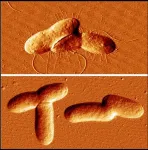Generative AI: Uncovering its environmental and social costs
2025-01-10
(Press-News.org)
A recent commentary article by researchers from Northwestern University, Harvard University, and The University of Texas at San Antonio highlights the significant but overlooked environmental and social impacts of Generative Artificial Intelligence (GenAI). Published in Environmental Science and Ecotechnology, the research underscores the urgent need for sustainable practices and ethical governance as GenAI technologies proliferate.
The study reveals the environmental toll of GenAI development, with hardware production such as GPUs and data centers consuming vast resources. Mining rare metals like cobalt and tantalum for these systems contributes to deforestation, water pollution, and soil degradation. Data centers, essential for GenAI operations, are projected to consume over 8% of U.S. electricity by 2030, further straining energy grids. Additionally, GenAI systems generate substantial e-waste, exacerbating global pollution challenges.
On the social front, the study highlights inequities in GenAI’s production and use. Labor concerns range from child exploitation in cobalt mining to underpaid workers training AI systems under precarious conditions. Unequal access to GenAI deepens the global digital divide, privileging industrialized nations and English speakers over marginalized communities.
The researchers advocate for immediate action to mitigate these impacts. Proposed measures include energy-efficient AI training, sustainable hardware designs, improved labor conditions, and inclusive governance frameworks. Transparency from developers and policymakers is essential, with recommendations for mandatory reporting of GenAI’s environmental and social footprint.
“This study sheds light on the hidden costs of GenAI and calls for collective action to address them,” said lead author Mohammad Hosseini. The findings provide a roadmap for fostering responsible and equitable AI development globally.
END
ELSE PRESS RELEASES FROM THIS DATE:
2025-01-10
FOR IMMEDIATE RELEASE
January 10, 2025
Contact:
Jillian McKoy, jpmckoy@bu.edu
Michael Saunders, msaunder@bu.edu
##
Lower Access to Air Conditioning May Increase Need for Emergency Care for Wildfire Smoke Exposure
As Los Angeles County battles the most destructive wildfires in its history, a new study suggest that US policies should prioritize equity and education regarding the measures people can take to protect themselves from the harmful pollutants in wildfire smoke.
People who have limited access to air ...
2025-01-10
If your teeth have ever felt fuzzy after skipping a brushing, you’ve encountered biofilm—a slimy bacterial layer that clings to surfaces. In medical settings, biofilms make infections harder to treat when they form protective shields for bacteria on devices like catheters and implants.
UC Riverside scientists have now discovered a chemical that plants produce when they're stressed prevents biofilm from forming. The breakthrough offers potential advances in healthcare as well as preventing equipment corrosion in industrial settings.
“In simple terms, biofilms are communities ...
2025-01-10
Hinda and Arthur Marcus Institute for Aging Research investigators at Hebrew SeniorLife have launched a large clinical food trial to test whether a combination of probiotics and prebiotics (BondiaÒ or SBD111) developed by Solarea Bio will help manage bone health in women aged 60 years and above. The first participants have joined the study and the Institute seeks additional women for the 18-month effort.
“I am very happy to be involved in this important research to help with bone health in women,” says study participant Kathy ...
2025-01-10
From mapping ore to predicting slope behavior and reclaiming land, mining is a rapidly evolving technological industry. Yet planning and operations have not necessarily kept up with the advancements.
With $1.25 million from the National Institute for Occupational Safety and Health, or NIOSH, mining and geological engineering researchers in the University of Arizona College of Engineering are boosting their efforts to better align technology and planning for improved safety and productivity.
The award from the institute, part of the Centers for Disease Control and Prevention, will fund the research ...
2025-01-10
PHILADELPHIA— Across the United States, no hospital is the same. Equipment, staffing, technical capabilities, and patient populations can all differ. So, while the profiles developed for people with common conditions may seem universal, the reality is that there are nuances that require individual attention, both in the make-up of the patients being seen and the situations of the hospitals providing their care.
New research shows that artificial intelligence can potentially help improve care overall by combing through ...
2025-01-10
TUCSON, Arizona — A researcher at the University of Arizona College of Medicine – Tucson received a $1.9 million grant from the National Institutes of Health to continue his research into uncovering the mysteries of copper – specifically, how it can be harnessed to kill harmful bacteria and other microorganisms.
“We started using copper tens of thousands of years ago to cut down on bacterial infections,” said Michael D.L. Johnson, PhD, an associate professor ...
2025-01-10
Embargoed until Friday 10-Jan-2025 14:00 ET (10-Jan-2025 19:00 GMT/UTC)
An international team of scientists has uncovered a fascinating piece of the evolutionary puzzle: how the ventral nerve cord, a key component of the central nervous system, evolved in ecdysozoan animals, a group that includes insects, nematodes, and priapulid worms. Their findings, published in Science Advances, provide valuable insights into the origins of these structures in the basal Cambrian period.
The research team, comprising Dr Deng Wang (Northwest University), Dr Jean Vannier (Université ...
2025-01-10
HOUSTON – (Jan. 10, 2025) – A study published in Science Advances shares new insights into how two of the most common types of chimeric antigen receptor (CAR) T cells kill cancer. Investigators from Baylor College of Medicine, Texas Children’s Cancer Center and the Center for Cell and Gene Therapy at Baylor, Houston Methodist Hospital and Texas Children’s Hospital examined how molecular dynamics at the immune synapse – where CAR T cells bind to cancer cells – affect anticancer activity.
In this study, researchers aimed to understand how CAR T cells with different signaling domains work at the molecular and cellular levels to lay the ...
2025-01-10
Scientists have discovered how plants adapt their root systems in drought conditions to grow steeper into the soil to access deeper water reserves.
Plant scientists from the University of Nottingham, in collaboration with Shanghai Jiao Tong University, have identified how abscisic acid (ABA), a plant hormone known for its role in drought response, influences root growth angles in cereal crops such as rice and maize. The results have been published in Current Biology.
The study highlights how ABA and auxin, another key hormone, work together to shape root growth ...
2025-01-10
A new study examining the use of high-cost drugs among patients with colorectal cancer and non-small cell lung cancer found those insured through Medicare Advantage received less expensive cancer drugs compared to others on Traditional Medicare.
The findings were published today in JAMA Health Forum.
"Lung cancer is the leading cause of cancer-related deaths in the United States and colorectal cancer ranks third. Gaining a better understanding of treatment options and their costs under different insurance plans is important for assessing the overall healthcare landscape and how insurances manage patient costs,” said the study’s first author Cathy Bradley, PhD, Dean ...
LAST 30 PRESS RELEASES:
[Press-News.org] Generative AI: Uncovering its environmental and social costs



